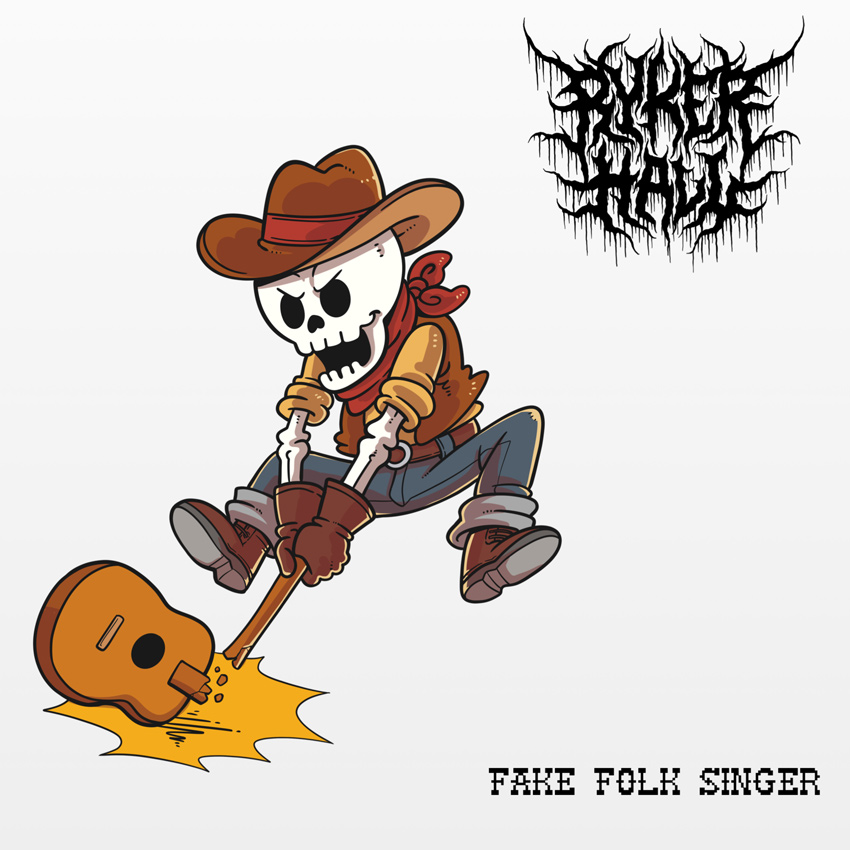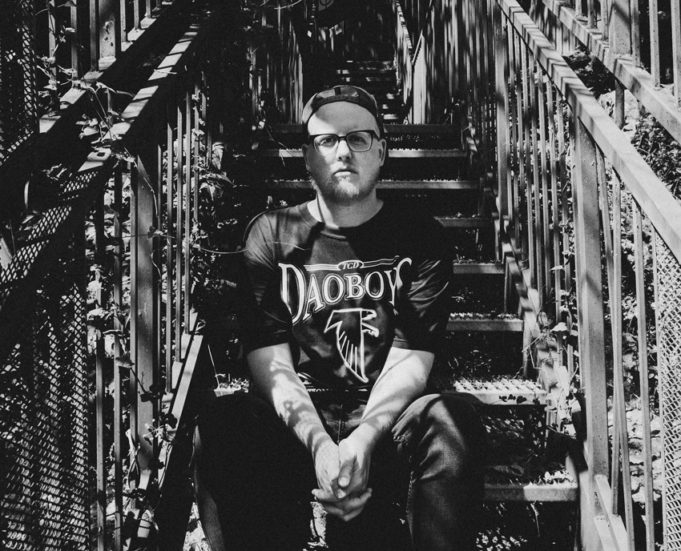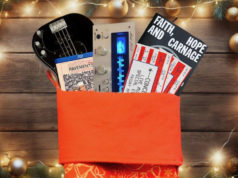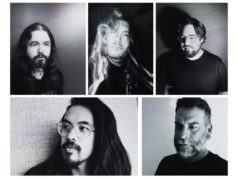A couple of weeks ago, Ryker Hall offered his new record, Fake Folk Singer, as a pre-release $5 download to generate buzz both for the EP’s debut on streaming services and his opening slot for the album release of honky-tonk balladeer Cory Cross’ album on September 6 at The Post. After Venmo-ing Hall five bucks, I had this thought: When was the last time I saw him play?
“Open Streets, this year, at the [Boiled] Owl,” I reminded myself, proud to recall something that had happened all the way back in April, but it also occurred to me that Hall had put out music pretty regularly since his 2018 debut, Soon You’ll Be a Skeleton — Fake Folk Singer is his sixth release in seven years — but that he just sort of fell off my radar. Turns out it’s been three years since his last release (Dystopian Chic, from 2022). That gap seemed kind of weird given the momentum and enthusiasm he had for his music a few years ago, at least in a “Hey, where’ve you been?” sort of way.
“I kind of disappeared for a while,” Hall said of that interim between recordings. “I dabbled in shows every now and then, but I kind of put music on the back burner.”
He declined to offer details about that time but allowed that he “got lost in trying to be someone I wasn’t. I was trying to fit a role … but at the end of the day, I’m just not ready to do that. I wanna be a musician. It’s all I care about. I learned a lot of hard lessons. … There were a lot of those over those couple years.”
Coming out of that period, Hall needed to reset his life. He moved back to his parents’ home in North Richland Hills to save money, working from home in a customer service job to rebuild his finances. Though reliable, that gig was as soul-crushing as it sounds, but the reset did provide him the time to pick up his guitar again.
“I’ve been working my ass off writing songs,” he said.
About a year ago, the idea of a “fake folk singer” popped into his head. “I just kinda was like, ‘That’ll be a funny name for a project.’ ”
But then he thought about what a fake folk singer is like — he said Americana hitmaker Zach Bryan comes immediately to mind — and the EP’s title track was born. Its chorus goes, “A public drunk on fake folk singer blues / Buzzword outlaws and bubblegum truths / Substance feels bludgeoned, it feels like a bit / I sound bitter and old, I guess.”
It’s a rueful middle finger thrown up at the facile pop that passes for folk songs these days, and it provided Hall with a little bit of catharsis, like he cleared a blockage in his soul. Working on the song delivered the jump-start Hall needed. “I just kind of started creating again … and I found the confidence to pursue this and make it my No. 1 [priority] again and give it my all. I feel like myself. I’ve never felt more like myself than I do now. I’m unashamed.”
Hall has always peppered his live performances with wry asides and self-deprecating jokes — a singer-songwriter’s between-song “tuning banter” is often just as critical to a good show as the songs, and Hall’s an affable engager of audiences — so one might argue that he’s always seemed pretty unashamed. But here, both his new lease on life and his penchant for planting his tongue firmly in cheek are at the forefront of his songs, even when his cynicism and disillusionment go deep as rust beneath the paint of a used car. The clearest distillation of this sentiment is in “Moshpit Retirement,” a defiant declaration to keep the rock ’n’ roll dream alive, in which he yells, “I’m as bald as I am bold.”
“Shit, dude,” he told me. “I’m as bald as it gets.”
One might also say he’s always been bold, having played in bands since he was in middle school, starting with a pop-punk outfit called the Borrowed Band (“like a 13-year-old’s Sum41”) that was followed by another pop-punk group, Signed in Scarlet. Music has always been his favorite thing. “I put down the skateboard and picked up the guitar when I was 10 and made more progress with that. I was too fat to kickflip, but I got serious about writing songs when I was, like, 17.”
Now approaching his mid-30s, Hall has long since honed his songwriting chops and pop-punk influences into the kind of acoustic emo tunes that made Chris Carabba famous, filtered through the emotional burnout common to his generation, a childhood bracketed by 9/11 on one end and the Great Recession’s fallout on the other, with two wars and dozens of school shootings in between. Hall processed this on Fake Folk Singer with “Thirst Trappin,’ ” about “my numbness to tragedy. As a generation, [millennials] have seen so much shit. By now, nothing’s shocking. It’s awful. Nothing ever changes, and the bad shit keeps happening. But, hey, at least the stock market’s OK. Allegedly.”
For all that millennial emotional anesthetization, Hall sounded kind of agitated discussing that shit, but overall, resuming his musical path has been a pretty affirming, empowering adventure.

In his telling, recording Fake Folk Singer sounded like a lot of fun. Its four songs were tracked, mixed, and mastered in two days by local producer Cuervo “357” Jones at his 3Fifty7 Studios in Fort Worth. Other than 357’s keyboard lines on “Hell of a Year” and “Thirst Trappin,’ ” Hall performed all the instrumentation, which, admittedly, is mostly acoustic guitars, some percussion, and a bass track on opener “Dreamy.” Hall often plays these songs live with a backing band, but as rendered in the studio, the space allowed by stripped-down accompaniment is a huge part of the EP’s appeal. His voice sounds huge, too, especially when he’s screaming into the void.
“We just scheduled two days when we could both get in there and powered through,” Hall said. “It was really fun process, just two dudes chilling, making a record, man.”
And since he’s gotten back in the songwriting saddle, he’s ranged far afield of the Cowtown bars and clubs he’s been playing for years, building a fanbase in places like Norman, Shreveport, San Antonio, Tyler, and Longview — he half-jokingly said his audience is “sad millennials and other old people like myself” — and the day of this interview, he quit his customer service job in the furtherance of his musical ambitions.
“That [job] made me nothing but miserable,” he said. “It took away time from being able to play gigs and travel, and I’m trying to do more of that and make music the focus.”
Still, he’s present to the realities of his chosen road. “It’s obviously pretty damn hard to survive as a full-time musician, especially in today’s economy, and you don’t wanna oversaturate. Playing in [Fort Worth] all the time kind of gets exhausting, and people don’t wanna see you all the time, so branching out has been huge for me.”
He really wants to get a foothold in Texas’ adjacent, out-of-state scenes, but he’d be just as happy to play regularly with southbound trips on I-35. “I mean, our state is huge. There are so many markets to be a part of.”
Given his recent clarity of purpose, Ryker Hall is poised to hit them all and show audiences that Fake Folk Singer is heavy with real emotions and big, singalong hooks.












